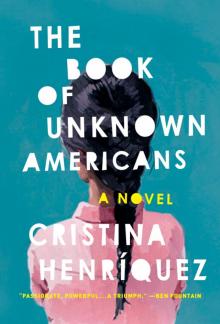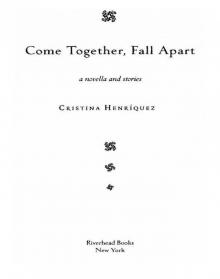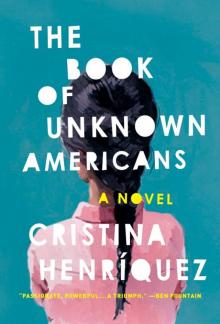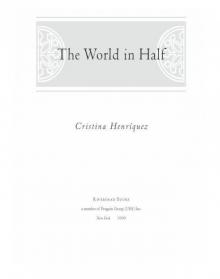- Home
- Cristina Henriquez
Come Together, Fall Apart Page 8
Come Together, Fall Apart Read online
Page 8
“Cheers is Boston culture,” her father said.
“You know what I mean!” her mother said, raising the menu and slapping it down on the table, the leather making a dull thud against the tablecloth.
Her father reached across and covered the menu with his hand to keep her mother from banging it again. “I remember very clearly that you said you wanted to go out somewhere nice. Now you’re saying we could have gone to a sports bar. What, exactly, is your definition of nice?” Her father was smiling, but not really.
Her mother leaned into him and looked straight into his eyes. Maria twisted the corner of her napkin in her lap. “I don’t know, Jack,” her mother said slowly. “But it doesn’t, at the moment, include you.”
Something tough and dense ballooned in Maria’s throat. She had never seen her parents like this with each other. Not even close.
A waiter delivered the wine to the table. Maria’s parents pulled apart.
“It looks wonderful,” Maria’s father said when the waiter showed him the label. The waiter poured two glasses. Maria excused herself to go to the bathroom before she had a chance to see whether her parents would make a toast, like they sometimes did, or whether they would start drinking silently, on opposite sides of the table.
Maria is in her room, sitting on the edge of her bed, leaning over to buckle her sandals, when she hears a crash. She leaves the sandals unfastened and they flop down the hallway as she walks quickly to her grandparents’ room.
“What happened?” she asks. Her grandmother is standing rigidly beside the bed, white opaque glass scattered around her feet, a few pieces clinging to her nylons, which she wears with her brown plastic sandals. Her grandmother is staring a pale, wide-eyed stare at her husband, still lying on his back. He looks the same as he did a few minutes earlier when Maria peeked in: his hands crossed on his stomach, cupped like he is hiding a snail underneath, his chest rising and falling with deep breaths. He is still sleeping.
“Are you okay?” Maria asks.
Her grandmother looks up, as if startled to see her. “I needed to change this lightbulb. Your grandfather had asked for a softer light”
“We’ll clean it up.”
Her grandmother nods, but Maria can see she is shaken.
“It’s okay,” Maria says. “An accident.”
“I know.”
Maria can see her grandmother is trembling slightly.
“He won’t be mad,” Maria says.
“Have you gone for the groceries yet?” her grandmother asks. When Maria shakes her head, her grandmother says, “Go.”
Maria hesitates.
“I’ll be fine here,” her grandmother assures her.
At the Supermarket Rey, Maria imagines her grandmother cleaning up the glass from the floor, picking the shards from her nylons. She imagines her grandmother walking with unsteady legs and shaky breaths, blinking her eyes quickly like she so often does when she is visibly agitated so that the world, Maria thinks, comes to her in pieces, like slides inserted one by one into a film projector. She sees her bending down and holding the broom handle where it meets the bristles and sweeping the glass and the dust and the lightbulb filament into the dustpan and throwing it all away. Maria is only about a quarter of the way down the list—she has collected some mangoes in a plastic produce bag and salami spicy with peppercorns from the deli, two cans of condensed milk, and a bag of pork rinds—but suddenly she stops and walks out of the store. She leaves the food behind her, on the bottom shelf at the end of an aisle, and pushes through the revolving door. Outside, the sun is like a flash from a camera. A row of older men and women, mesh bags at their feet, delicate wooden tables like TV trays in front of them, are lined along the supermarket sidewalk, selling lottery tickets. When Maria was younger, her mother bought her a ticket once and she won three dollars. Everyone in Panama plays the lottery, her mother explained. And they watched, along with the rest of the city, the television show dedicated to announcing the winning numbers. When Maria saw that she had won, she and her mother went to wait in a long line with other winners to collect their money. Now, Maria considers buying a ticket again. Maybe it will bring good luck. Maybe it will bring just what her grandparents need. But in the next second she decides it doesn’t matter. She just wants to get home.
A blue car is parked in the gravel driveway when Maria returns to the house. A sticker on the back windshield says MEDICO. Maria’s feet and ankles are dusty from walking on the dirt roads to the store and back, but she does not bother to take off her sandals first and wash her feet with the hose lying in a lazy coil out front—something her grandmother usually insists that she do. Instead, she walks straight to her grandparents’ bedroom.
The doctor, a short man with gray hair and a gray mustache, in a white shirt with a white undershirt visible underneath, stands beside the bed. His black leather bag is slumped on the floor at the foot of the bed. Maria hears her grandmother saying, “Three doctors. One when he was born, a second with the blindness, and now you. Be gentle.”
“It’s no problem,” the doctor says.
“Abuela,” Maria says softly.
Her grandmother looks up and forces a smile. “Doctor, my granddaughter.”
The doctor, his hand on her grandfather’s forehead, does not acknowledge her.
“I came back to make sure you were okay. What’s wrong?”
“I don’t know. Doctor, do we know yet?”
The doctor shakes his head.
“I had trouble waking him up,” her grandmother explains. “And he didn’t want to talk to me when I did, except to tell me to call a doctor.” She takes Maria’s elbow. “Let’s wait in the kitchen,” she says.
The examination does not take long. Maria’s grandmother melts a hunk of cheddar cheese on bread for Maria while they wait.
“If you had gotten the groceries, you could have it with salami, too,” she says, then laughs, though nervously. “You can go back to the store after the doctor leaves.”
When the doctor walks into the kitchen, leather bag in hand, he joins them at the table. Maria’s grandmother becomes silent. Outside, a bird pecks at the window, chirps, and then flies off again. The air is hot and muggy. The tube lightbulb above them hums a steady buzz.
Finally, the doctor sighs and says, “We don’t really need to be here.”
“What does that mean?” Maria’s grandmother says, suddenly angry. “I know you believe in God, Doctor. Of course we don’t need to be here. But we are, we’re blessed to be here, and my husband is no exception. If you’re going to start telling me about the darkness that awaits—”
“Señora,” he says, and sighs again. “I’m sorry. I only meant that there’s no need to be in this room for me to say this. We could have had this conversation anywhere and your husband wouldn’t know the difference.”
Maria’s grandmother wrinkles her eyebrows.
“I’m sorry, I’m not explaining well. This is difficult to say, but actually I’m quite sure. Señora, your husband is deaf”
Maria feels a rush through her stomach, up into her throat and back down again, and she watches as her grandmother shakes her finger at the doctor. “No,” she says. “He could hear me yesterday.”
“I don’t think he could.”
“Were you here yesterday? You didn’t see him.”
“I think he knows when you come into the room. I think there are vibrations he can sense to know when you’re talking. And I think when he talks, he says the same things every day, because he assumes you do, too. He assumes when he says, ‘I’m ready for lunch’ or ‘I’m feeling fine’ that it makes sense because he’s been saying those things in more or less the same order for a while now. How long has he been lying in that bed?”
“Two months,” Maria’s grandmother says softly.
“And over time, has he started to seem more disoriented?”
“He gives answers to questions I didn’t ask. But only sometimes.”
“I don’t kno
w why he waited so long to have you call a doctor. He must have known.”
Maria watches her grandmother rise from the table. She looks as though she might fall.
“Abuela?” Maria calls.
But her grandmother doesn’t respond. She brushes her hand in the air at Maria and begins to walk slowly from the kitchen.
When her family returned to New Jersey her mother started calling lawyers. Maria knows this because there were messages from two of them one day when she came home from school. Just returning your call, they both said. Her mother knew a lot of lawyers, so maybe they were simply friends of hers, but Maria played the messages a few times and decided they sounded too formal for that. She wondered whether her father knew about these calls. She deleted the messages before either of her parents came home.
Maria was having trouble understanding it, how this had happened from one day to the next. A few weeks earlier, things were how they had always been—her father trying too hard, her mother rolling her eyes at his antics; her mother spoiling Maria with trips to the mall, her father sighing at the credit card bills; her parents taking Maria to her favorite pizza restaurant on Sunday nights. And now, suddenly, they were getting divorced. Maria was sure of that.
When she told her friend Denise about it on the phone, Denise said, “They were pretending before. I know you said you didn’t see it coming, but they did that on purpose, you know? Like to spare your feelings. When my parents got divorced they tried really hard to keep it a secret. They were normal to each other for a long time even though they weren’t normal underneath. They just didn’t want me and Davey to see it, you know? But then the pot boiled over. As they say.”
“I don’t know if it’s the same thing,” Maria said, even though it sounded like it could be.
“I’m just saying. People can go for a long time fooling everybody around them. But eventually it comes out. You know Rico, from our health class last year? The same thing happened with his parents.”
Maria said, “But my parents were actually happy before.”
“I know,” Denise said. “I’m really sorry.”
Maria started looking for clues, watching her parents closely, analyzing their words and gestures and unconscious expressions. When she came downstairs in the mornings, she felt relieved when they were already gone because it meant that at least for a few hours, she wouldn’t have to hear news of a divorce. The weekends were worse, because she always anticipated them together, at the table, waiting for her, even though they never were. And the days when her mother worked from home were nerve-racking, too, because there was always the possibility of her mother asking Maria to join her for her lunch break so that they could talk.
But Maria’s parents didn’t say anything. The bitterness and exasperation seeped through the house like steam; it spread all over, making the air stifling, but they didn’t say anything.
Then, with the end of the summer approaching, one night they asked her to come into the TV room. Maria’s father muted the television when she walked in. Her mother picked up the remote control and turned the set off completely. Her father rolled his eyes.
They were silent until her father asked, “So, how’s your summer going?”
“Okay.” Maria studied her parents’ faces carefully, readying herself.
“Newspaper job’s not the greatest?”
Maria had been answering phones—starting subscriptions and canceling them—for their local newspaper since returning from Boston.
“It’s okay.”
“I used to have a job in newspapers. Delivering them. This was before the Internet, of course, but I had a green bike with a basket on the front and one on the back, and at four in the morning—”
“Jack,” Maria’s mother interrupted. “What are you talking about?”
“I already know what’s going on,” Maria blurted.
Her parents looked surprised.
“We bought you a plane ticket to Panama,” her mother said. “Is that what you mean?”
“What?”
“We thought it would be nice for you to see your grandparents, to go away. You’ve been working hard all summer.”
“You’re not going?” Maria asked.
“It’s a direct flight. Your grandparents will be at the airport to pick you up. You’ll be fine.” Her mother smiled worriedly, as if she was afraid Maria could see right through her to what was really going on. And even though she could, she also kind of wanted to go, to leave her own house for a while, to get a continent away.
“For how long?”
“A week,” her mother said.
“What do you think?” her father asked.
“Give her a minute,” her mother said.
“I’m not allowed to talk?” her father shot back.
Maria’s mother stared at him blankly.
“I said, talk! Am I allowed to do that anymore or do I need written permission?”
Maria felt alarmed, watching them. It was like they lacked the skills to communicate with each other anymore. It was as if, when her father spoke, her mother looked at him and saw a little goldfish, popping open his mouth over and over again but making no sound. And when her mother spoke, her father looked and saw a piranha doing the same thing.
“I’ll go,” Maria said finally, and everybody looked relieved.
Long after the doctor leaves, Maria gets up from her chair. The world around her has grown a sort of chocolate dark, the lights from the city keeping it from getting completely black. The moon is a sliver in the sky and she thinks, mercury. Tonight it must be mercury.
For hours, Maria has been imagining the conversations she and her grandfather could have had and now never will. She wanted to show off her Spanish. She wanted to have a conversation with him by herself for the first time.
Her grandmother went straight to the bedroom and hasn’t come out since. Maria assumes both her grandparents are sleeping by now. She wonders if she should call her mother. Her parents gave her a phone card before she left so that she wouldn’t add to her grandparents’ bill. The card is on the table beside her bed, next to a pot of lip gloss. It seems like her mother should know. But Maria’s mind turns again to her grandfather. We will never have a conversation, she repeats to herself It’s like being hollowed out inside, everything scraped away but sadness.
There are tears on her face when she begins, too, to think of her parents, who speak the same language but cannot understand each other.
Maria walks through the dark to her room. At the foot of her bed is the letter she wrote earlier that day. She tears it into quarters and pushes the pieces into the dust under her bed with her toe. Then she makes her way down the hall to her grandparents’ room. She doesn’t knock and she doesn’t wait. She opens the door and crawls onto the bed between them, on the pilled sheets, and closes her eyes. Her grandmother breathes heavily with her head on her arm. The air smells of medicated cream and mothballs. Maria traces Good night, in Spanish, on her grandfather’s forearm. She whispers, “Buenas noches,” to her grandmother in the dark. Then she goes to sleep and dreams of everything else she wants to say.
BEAUTIFUL
And then that summer when the heat felt like wading through molasses and the streets hummed in a desperate sadness all day and all night, God came down from heaven and paid a visit to our family in two ways: My father returned home and my uncle got rich. The second way happened first and there were many people later who would say that it was the only reason my father returned, that he must have heard the news about his brother and wanted to cash in, but at the time they were just two unrelated miracles as far as I was concerned. And I was thankful.
My Tio Arrocha calls my mama first thing in the morning to tell her the news, to tell her he’s won the lottery for real this time, the big prize, he’s done it, and I can hear him hollering right through the phone. I am standing in the hallway watching as she runs to the television in her slippers and thin nightgown, the telephone against her ear. She picks up
the green notebook that she keeps in the drawer and opens it and looks at the numbers she has written down, all in pencil, in rows and rows, like an army marching on the page, and traces along with her finger. She starts nodding, Yes yes, wait, what was the last one? Yes, oh, JesusMaryandJoseph, you really did it! and crosses herself over and over and stands up and sits down and stands up again, walking around in circles.
The front door is open like it always is except when we’re sleeping, and through it, through the coconut trees at the edge of our property, I can see two dogs that our neighbors keep in their yard behind a fence. I smile at the dogs from inside the house.
Mama gets off the phone after a good while and I run back into my bedroom, sliding on the tile floor in my socks, and quick lie down in my bed. She comes in smiling, flushed, looking like she’s ready to burst, like my friend Charito when she tries to hold her breath underwater for too long. Mama tells me to get up because Tío Arrocha is on his way over.
What for? I ask, because I want her to tell me what’s going on with the lottery and everything; I want to know how much money he has now—my rich uncle!—and I am pretending like I don’t know anything about it yet. But all she says is, Tio Arrocha is coming over to take you out. I look at her once more with pleading in my face, but she’s hardly even there. Her face is a pink balloon all filled up and she’s floating out of the room, bouncing around against the air.
When my uncle comes over I am waiting on one of the plastic-covered chairs that are like sitting on taffy. I am wearing my best clothes, which means a pair of brown sandals, even though one of the buckles is broken so I use a safety pin to keep it together; a pale lavender dress that was pilled in the skirt so Mama stitched a white apron onto the front to fancy it up; and a headband to hold back my hair, which I spent all last summer growing out and that Mama says looks best when it’s pulled back off my face. Because I have such a pretty face, she explains. Mamá’s smoothing down my hair when Tio Arrocha comes in and she shrieks and runs to him and gives him one glorious hug. He’s laughing and telling her it’s not like he did anything, just got lucky is all. But Mama is glowing like Jesus Christ himself walked into our house.

 The Book of Unknown Americans
The Book of Unknown Americans Come Together, Fall Apart
Come Together, Fall Apart The Book of Unknown Americans: A novel
The Book of Unknown Americans: A novel The World in Half
The World in Half